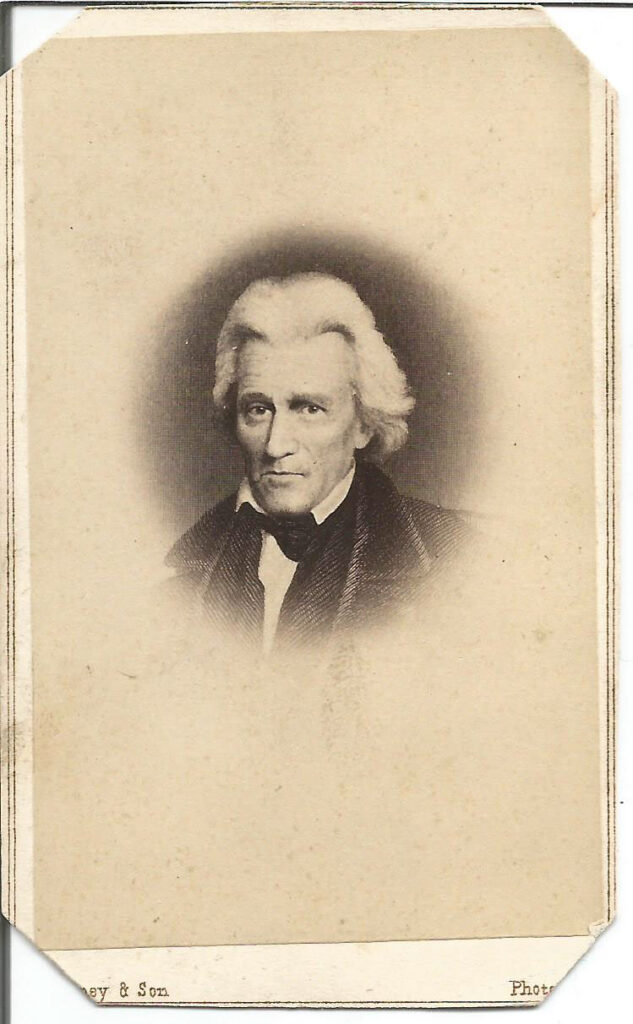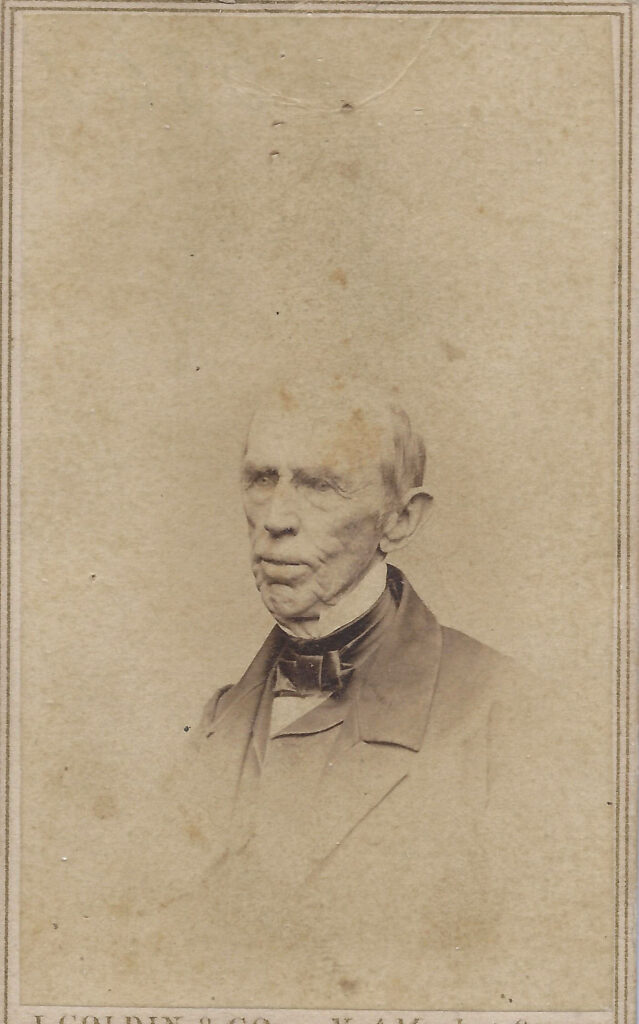Section #7 - A populist western president stands against Nullification and for tribal relocation
Chapter 61: Jackson Splits With Calhoun And Sacks His Entire Cabinet
April 13, 1829
Jackson And Calhoun Offer Conflicting Dinner Toasts

Little by little it dawns on Andrew Jackson that his Vice-President, John C. Calhoun, is not to be trusted.
The President has yet to learn about the attacks on his conduct during the Seminole War made back in 1818 by then Secretary of War, Calhoun. At that time, Monroe asks his cabinet if Jackson should be arrested for his actions – with Calhoun saying yes, and, ironically, only Secretary of State, JQ Adams, disagreeing.
But Jackson is well aware that Calhoun worked from within against Adams throughout his term, and senses this same pattern developing – this time around the call from South Carolina surrogates like Hayne to “nullify” the 1828 Tariff.
The old General is not one to brook insubordination within his ranks for long.
His anger at Calhoun surfaces on April 13, 1829, at the Indian Queen Hotel in Washington during the annual celebration dinner honoring the memory of Thomas Jefferson.
When the time for after dinner toasts rolls around, all eyes turn to Jackson, whose words echo like a battlefield command:
Our Union – it must be preserved!
The Vice-President recognizes that these words are meant for him and his fellow nullifiers. But instead of the usual “here, here” support, Calhoun reacts defensively by asserting Liberty as the higher calling.
Our Union, next to our liberty, most dear! May we always remember that it can only be preserved by distributing equally the benefits and the burdens of the Union.”
The toast is widely regarded as a form of defiance by Calhoun – his attempt to correct the President’s misguided commitment to the Union at any price.
The ever wily Martin Van Buren, now offers a third toast, apparently playing the peacemaker, but also registering for posterity the growing rivalry between Jackson and his Vice-President.
Mutual forbearance and reciprocal concessions. Through their agency our Union was founded. The patriotic spirit from which they emanated will forever sustain it.
Both the Hayne-Webster debates and the Jackson-Calhoun toasts set the stage for what lies ahead for America – an ever more crucial search for “mutual forbearance and reciprocal concessions” between the North and the South over the future of slavery.
1829-31
The Political Infighting Is Intensified By “The Petticoat Affair”
Midway into his first term, the short fuse on Jackson’s temper is ignited by turmoil within his cabinet.
The root cause is a developing rivalry between factions aligned with Vice-President John Calhoun and those backing the President and Martin Van Buren.
But the trigger for Jackson is a sustained backbiting campaign to shun Peggy Eaton, the wife of his Secretary of War, on grounds of questionable moral standards.
The charge particularly grates on the President because he and his wife, Rachel, suffered comparable smears throughout the mud-slinging campaign of 1828. In fact, Jackson remains convinced that Rachel’s fatal heart attack just prior to his inauguration resulted from being publicly labelled as an adulteress.
Rumblings about Peggy Eaton go back to her youthful days, working the bar at her father’s Franklin House inn near the Capitol. After several courtships, she is married at age seventeen to a 39 year old Navy man, John Timberlake. Among the couple’s friends is John Eaton, a Senator from Tennessee, close friend of Jackson, and an early widower.
When Timberlake’s personal finances collapse and he turns to alcohol, John Eaton helps out, both with funds and by securing a naval post for him in the Mediterranean fleet. With her husband away, Peggy returns to her job at the Franklin House, which now caters almost exclusively to Congressional members and their wives.
Gossip follows quickly – how can a married woman be considered respectable while working for a wage, and in a bar no less? This accelerates when Timberlake dies at sea in April 1828, and a rumor spreads that he killed himself after hearing that Peggy and John Eaton had become lovers. The rumor is supported eight months later when the two are wed – after receiving a blessing from none other than John’s mentor, Andrew Jackson.
Despite the couple’s connections in Washington, many in the social elite choose to boycott the wedding, on the grounds that, in violating the traditional year-long mourning period, Peggy’s conduct is unseemly.
When Jackson names Eaton as his Secretary of War, the social knives are bared among other cabinet wives – the most notable and vocal being the aristocratic Floride Calhoun, who initiates a series of slights aimed at humiliating the new couple. She asserts that Peggy is “a promiscuous woman” and convinces her allies to refuse to attend social events, especially at the White House, where the Eatons are present.
After enduring almost two years of this, Jackson decides he has had enough of the foolishness. Surely the wives of his cabinet cannot be allowed to undermine Eaton’s role as War Secretary, and surely it is time for him to step in and protect Peggy’s honor. As he says at the time:
I would rather have live vermin on my back than the tongue of one of these Washington women on my reputation.
Early in 1831 he decides to act.
August 31, 1831
Jackson Breaks With Calhoun And Sacks His Cabinet

Member of Jackson’s New Kitchen Cabinet
The venom he feels is directed particularly at John Calhoun.
He knows that the Vice-President has been plotting behind his back to nullify the 1828 Tariff, and that Floride Calhoun is the ring-leader hoping to defame Peggy Eaton. But he also learns in February 1831 that Calhoun is behind the public disclosure of letters critical of Jackson’s actions in Florida in 1818 during the Seminole War.
In response he makes it clear that he intends to support Van Buren for Vice-President in 1832.
This message reaches Calhoun, who recognizes that his chances of ever winning the presidency have all but vanished. Instead he will henceforth dedicate his political career to convincing the South to face the existential threats he says is building in the North.
Van Buren, who has backed the Eatons all along, sees the so-called “petticoat affair” as another attempt by the “Calhounites” in the cabinet – Ingham, Berrien and Branch – to undermine both Jackson’s administration and his own future political aspirations. After he convinces Eaton to resign, the President goes further, requesting that all his appointees step aside.
Which they do by August 31, 1831, the only exception being Postmaster Barry, who stays on at Jackson’s request. Van Buren quickly assumes the post of Ambassador to Great Britain.
In turn, Jackson names a new cabinet, including several members who will play prominent public roles for years to come. Attorney General Roger Taney will succeed John Marshal as Chief Justice of the Supreme Court and preside for 28 years. Lewis Cass, who fought in the War of 1812 and opened the Michigan territory as governor, will go on to run for President in 1848, and lead the “popular sovereignty” wing of the Democratic Party from then on. Levi Woodbury will eventually become Secretary of the Treasury and then Associate Justice on the Supreme Court. Louis McLane becomes both Secretary of the Treasury and of State, then president of the Baltimore & Ohio Railroad Company.
Andrew Jackson’s Cabinet In September 1832
| Position | Name | Home State |
| Vice-President | John C. Calhoun | South Carolina |
| Secretary of State | Edward Livingston | New York |
| Secretary of Treasury | Louis McLane | Delaware |
| Secretary of War | Lewis Cass | Michigan |
| Secretary of the Navy | Levi Woodbury | New Hampshire |
| Attorney General | Roger Taney | Maryland |
| Postmaster General | William Barry | Kentucky |
As impressive as this replacement cabinet is, Jackson, like many future presidents, decides to rely on a tight circle of long-time trusted advisors to decide on policy and political matters.
Van Buren and Taney are part of this informal “kitchen cabinet.” So too is Jackson’s nephew and “adopted son,” Andrew Jackson Donelson. The rest tend to be long-time friends from Nashville or newspapermen who have helped shape and disseminate his agenda and messages.
Jackson’s “Kitchen Cabinet” Of Informal Advisors
| Members | Connections |
| Martin Van Buren | Campaign manager, protégé, chosen successor |
| Amos Kendall | Speech/policy writer for AJ, editor of KY Argus paper |
| Roger B. Taney | Early AJ backer and legal advisor |
| Francis P. Blair | Editor of pro-AJ Washington Globe, main party organ |
| Andrew Jackson Donelson | Nephew and adopted son of AJ, Hermitage roots, private secretary |
| John Overton | Nashville pal, AJ dueling “second,” judge, planter, business partner |
| Isaac Hill | Editor New Hampshire Patriot, politician, early AJ backer |
| William B. Lewis | Nashville pal, army quartermaster for AJ |